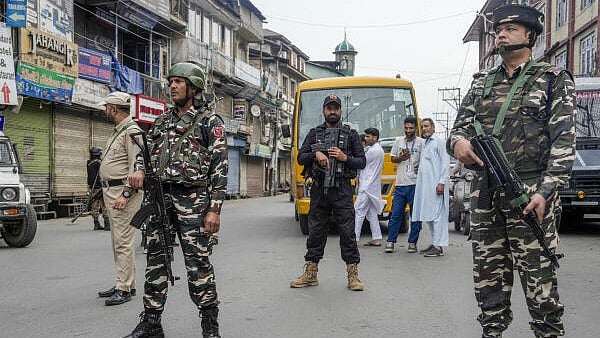
Security personnel stand guard in Jammu and Kashmir.
Credit: PTI Photo
Srinagar: As Jammu and Kashmir marked the sixth anniversary of the abrogation of Article 370 on Tuesday, the Valley remained calm and largely unaffected by days of swirling speculation that major political announcements could be made by the Centre.
Educational institutions were open, government offices functioned normally and traffic moved routinely across Kashmir. There was no extraordinary security presence on the ground, and early morning reports from various districts indicated business as usual.
Over the past week, the Valley has been abuzz with rumours—ranging from the possibility of statehood being restored to Jammu and Kashmir, to a more controversial theory that Jammu and Kashmir could be separated, with Jammu granted full statehood and the Valley remaining a Union Territory.
Another widely circulated version suggested the return of statehood conditional upon the holding of fresh elections, given that the last polls were held when J&K was a Union Territory.
So far, however, there has been no official word from New Delhi on any such move. The J&K administration too has remained tight-lipped, fuelling further speculation.
August 5, 2019, remains one of the most defining dates in Kashmir’s recent history. On this day, the Centre revoked Article 370, stripping Jammu and Kashmir of its special constitutional status, and bifurcated the region into two Union Territories — Jammu and Kashmir, and Ladakh.
Initially marked by curfews and communication blackouts, the day has in recent years seen a gradual return to routine. This year too, normalcy prevailed, though political undercurrents remained strong.
Opposition Peoples Democratic Party (PDP) president and former Chief Minister Mehbooba Mufti posted on X: “August 5 marks a black day not just for Jammu & Kashmir, but for the entire nation.”
“On this day, the Constitution was subverted not by foreign hands, but from within, by a brute majority in the heart of our democracy. The unconstitutional abrogation of J&K’s special status was not an end; it was the beginning of a broader assault on constitutional values,” she said.
Adding a layer of poignancy to the day, former J&K Governor Satya Pal Malik, who held office at the time of the Article 370 abrogation, passed away in Delhi on Tuesday morning. He was the last Governor of the erstwhile state of Jammu and Kashmir and played a key administrative role during the transition period following the Centre’s August 2019 move.
In the years that followed, Malik remained a vocal political figure, often critical of the Modi government’s policies and handling of Kashmir and national issues.
His passing on the very date of the Article 370 revocation — a decision he helped oversee — did not go unnoticed in the public discourse, with many describing it as a “strange historical coincidence.”